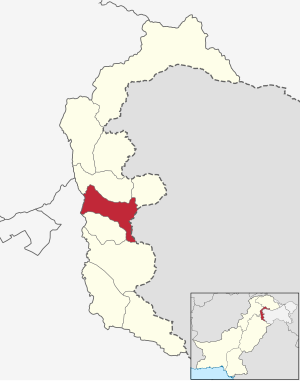Poonch District, Pakistan
Poonch District
ضلع پونچھ | |
|---|---|
Gojri | |
| Number of Tehsils | 4 |
Poonch District (
The main language is Pahari ("Punchi"), native to an estimated 95% of the population, but there are also speakers of Gujari,[6] while Urdu has official status.

History
17th Century to 1946
From the end of seventeenth century up to 1837 CE, Poonch was ruled by the Muslim
Separation of Poonch

(The Poonch Divion was created from the Azad Kashmiri-administered portion of the pre-1947 Poonch District.)
After independence in 1947, there was a
1949 to Present
The Pakistan-administered portion of the Poonch district was reorganised as the
Poonch district was the main area of violent anti government revolt (led by the Sudhan tribe) during the 1955 Poonch uprising, which lasted from early 1955 to late 1956.[7]
Administrative divisions
The district is administratively subdivided into four tehsils:[8]
- Abbaspur Tehsil
- Hajira Tehsil
- Rawalakot Tehsil
- Thorar Tehsil
Education
According to the Pakistan District Education Ranking 2017, a report released by Alif Ailaan, the Poonch District is ranked at number 8 nationally, with an education score of 73.52. Over the past five years, the Poonch District has shown the most improvement in the establishment of middle schools. The learning score for the Poonch District is 84.15.[9] The school infrastructure score for the Poonch District is 14.88, ranking the district at number 151, which places it in the bottom five districts relating to infrastructure in Pakistan and its two dependent territories. Schools in the Poonch District also have severe problems with regard to electricity, drinking water, and boundary walls, as reflected in their scores of 2.67, 12.1, and 6.23, respectively.[9] The state of some school buildings also presents a major safety risk for students.
Transport
The Poonch-Rawalakot Bus, which crosses the LOC, has helped to re-establish ties across the border.[10]
See also
- History of Poonch District
- Poonch district, India
- 1947 Poonch Rebellion
- Poonch Medical College in Rawalakot
References
- ^ due weightin the coverage. Although "controlled" and "held" are also applied neutrally to the names of the disputants or to the regions administered by them, as evidenced in sources (h) through (i) below, "held" is also considered politicised usage, as is the term "occupied," (see (j) below).
(a) Kashmir, region Indian subcontinent, Encyclopaedia Britannica, retrieved 15 August 2019 (subscription required) Quote: "Kashmir, region of the northwestern Indian subcontinent ... has been the subject of dispute between India and Pakistan since the partition of the Indian subcontinent in 1947. The northern and western portions are administered by Pakistan and comprise three areas: Azad Kashmir, Gilgit, and Baltistan, the last two being part of a territory called the Northern Areas. Administered by India are the southern and southeastern portions, which constitute the state of Jammu and Kashmir but are slated to be split into two union territories.";
(b) Pletcher, Kenneth, Aksai Chin, Plateau Region, Asia, Encyclopaedia Britannica, retrieved 16 August 2019 (subscription required) Quote: "Aksai Chin, Chinese (Pinyin) Aksayqin, portion of the Kashmir region, at the northernmost extent of the Indian subcontinent in south-central Asia. It constitutes nearly all the territory of the Chinese-administered sector of Kashmir that is claimed by India to be part of the Ladakh area of Jammu and Kashmir state.";
(c) "Kashmir", Encyclopedia Americana, Scholastic Library Publishing, 2006, p. 328,ISBN 978-1-84904-621-3Quote:"Some politicised terms also are used to describe parts of J&K. These terms include the words 'occupied' and 'held'." - ^ "Statistical Year Book 2019" (PDF). Statistics Azad Jammu and Kashmir. Retrieved 20 April 2020.
- ISBN 978-0-19-577692-8.
- ^ "AJK at glance -2020" (PDF). Planning and Development Department of AJK.
- ^ "University of Poonch VC Prof. Dr. Zakaria directed to complete construction of campuses on war footing". Azadi Times. Retrieved 8 August 2022.
- ^ Statistical Year Book 2020 (PDF). Muzaffarabad: AJ&K Bureau Of Statistics. p. 140. Retrieved 3 March 2022.
- ISBN 978-9350298978.
- ^ "Tehsils of Poonch District on AJK map". ajk.gov.pk. AJK Official Portal. Retrieved 17 November 2019.
- ^ a b "Pakistan District Education Rankings 2017" (PDF). elections.alifailaan.pk. Alif Ailaan. Archived from the original (PDF) on 30 July 2018. Retrieved 17 November 2019.
- ^ Mughal, Roshan (16 April 2011). "Intra-Kashmir bus service completes six years". The Express Tribune. Retrieved 21 November 2023.
Bibliography
- ISBN 978-9350298985
- Snedden, Christopher (2015), Understanding Kashmir and Kashmiris, Oxford University Press, ISBN 978-1-84904-342-7
External links
- Official website of the Government of Azad Kashmir
 Azad Jammu and Kashmir travel guide from Wikivoyage
Azad Jammu and Kashmir travel guide from Wikivoyage

